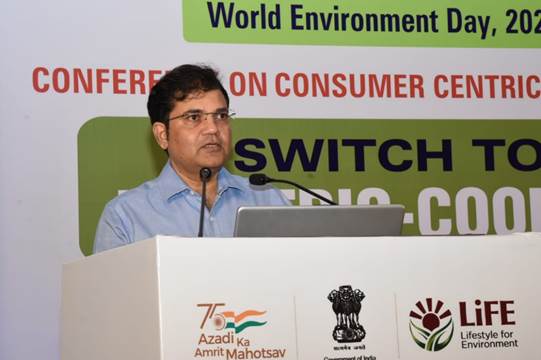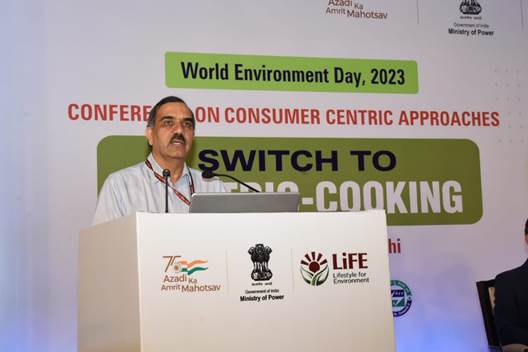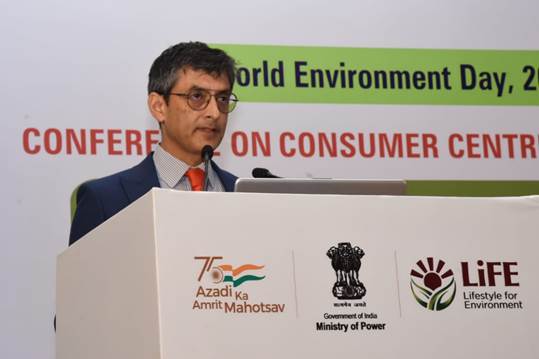Ministry of Power
On 50th anniversary of World Environment Day, Government holds Conference on Consumer-Centric Approaches for E-Cooking Transition
E-cooking is going to be the future of the Indian kitchen, need Affordable Business Models: Additional Secretary, Power
Posted On:
05 JUN 2023 12:02PM by PIB Delhi
How can we accelerate the deployment of energy-efficient, clean and affordable e-cooking solutions in India? On World Environment Day today, a conference organized in New Delhi by the Bureau of Energy Efficiency (BEE), Ministry of Power, Government of India, in collaboration with CLASP, sought to find new answers to this question. The “Conference on Consumer-Centric Approaches for E-cooking Transition” brought together institutional consumers, consumer research groups, policy makers, think tanks and manufacturers in a discussion on strategy for the transition to electric cooking.
Delivering the special address, Additional Secretary, Ministry of Power, Ajay Tewari said that e-cooking is going to be an environment-friendly habit for all Indians in the times to come. “Some people take it very lightly, but e-cooking has many dimensions for families in urban and rural areas. Given our large population, a change in our behaviour can have the biggest impact on the planet.”
Speaking about Mission LiFE launched by the Prime Minister at the 26th UN Climate Change Conference of the Parties (COP26) in Glasgow in 2021, the Additional Secretary said that India has emerged as the leader in energy transition. “We are going to achieve renewable energy targets much earlier than the timelines we announced. This is evident from our achievement of Nationally Determined Contributions nine years ahead of target and our renewable energy targets.”
Move towards e-cooking driven by 24/7 Electricity
The Additional Secretary said that we want to move towards e-cooking since we have 24/7 electricity in our households. “India has, in just 18 months, given Saubhagya connections to 26 million households who did not have electricity access. Never before in the history of the world has so many households been given electricity connection in such a short time. We are supplying energy for 23.5 hours in all urban areas and 23 hours and more in rural areas. It is a big achievement that the age of power cuts is behind us.” He added that 700 million people in the world however still do not have access to electricity and that universal energy access is one of the priorities of G20.

“E-cooking is going to be the future of the Indian kitchen”
The Additional Secretary asserted that once all Indian households have electricity access, e-cooking is going to be the future of the Indian kitchen. “We can promote electric cooking since the technology is available. It must be scaled up, a model needs to be developed so that the energy comes from renewable sources, so that there is aggregation of carbon credits. The model should work in such a way that it becomes affordable in both urban and rural areas.”
“Need to come up with Affordable E-Cooking Business Models”
After success of UJWALA and thus having transitioned to clean cooking, we now want to make the transition to e-cooking, said the Additional Secretary. Highlighting the importance of affordability, he said that we must promote e-cooking from renewable energy sources such as solar power and thermal power. “We are coming up with aggregation models whereby prices can be brought down. We are moving towards an Indian model of e-cooking to serve Indian kitchens. If we have standard and affordable models, we should be able to cover all urban areas within 2-3 years. By 2030, we will like to cover as many households as possible under e-cooking. This will contribute significantly to our fight against climate change.”
“Very few technology barriers towards adopting e-cooking, need replication at Scale”
In his keynote address, Director General, Bureau of Energy Efficiency, Abhay Bakre said that we have today come to an important juncture in our movement towards environment protection where we are moving ahead with Mission LiFE. Speaking about electric cooking, the Director General said that there is comparatively very little research required in this field since we have e-cooking appliances and consumers too are aware of this. “The principal barriers towards adopting e-cooking were customers’ concerns regarding potential faults in e-cooking appliances and whether all dishes could be prepared using e-cooking. When we launched the GO Electric Campaign, we faced big challenges such as setting up the electric vehicle charging infrastructure, the cost of Electric Vehicles and the production capacity. Contrary to this, we don’t have such challenges in e-cooking. We have found that almost all dishes prepared using conventional stoves can be prepared using e-cooking as well. So, what is needed is replication at scale. Our focus has been on kitchens and locations where cooking can happen for longer periods of time, of 8 – 10 hours per day. Rather than going for full replacement, consumers could go for replacing 50% of their cookers by electric cookers, so that they get the time to build confidence in e-cooking before making full transition.”

“E-Cooking a Win-Win for both Power Sector and Consumers”
Speaking about Sustainable Development Goal 7.1, the Director General said that 2.1 billion people do not today have access to clean cooking, and are exposed to harmful ways of cooking. “The promotion to e-cooking is a natural way of moving ahead with the SDGs, which are to be achieved by 2030. The first part – universal access to electricity – has been achieved in India. Most of our households also have access to LPG, thanks to UJALA. When we transition to e-cooking, it is going to be a much cleaner fuel. Electric cooking is the future and consumer participation is very important here. E-cooking can save energy consumed in reheating as well.” In conclusion, the DG said that we have to start with urban areas and move to Tier-2, Tier-3 towns and then to rural areas. He said that by 2030, e-cooking is going to be a win-win solution for both the power sector and for consumers as well.
“Transition to e-cooking can improve quality of life, reduce carbon emissions and improve indoor air quality”
Senior Director, CLASP, Bishal Thapa recalled that as we celebrate the 50th anniversary of World Environment Day today, it is time for decisive and transformative action and that the transition to e-cooking represents that opportunity. Noting that the Prime Minister’s articulation of Mission LiFE is bold and visionary, he said that the transition to e-cooking will enable a cleaner, greener and environmentally benign lifestyle. “The potential for e-cooking is not limited to rural areas. It is highly relevant for households and commercial areas in urban areas as well. The transition to e-cooking can help reduce energy imports and reduce our supply vulnerabilities. Overall, the transition can improve the quality of life, reduce carbon emissions and significantly improve indoor air quality.”

The CLASP Senior Director said that the transition now requires greater consumer awareness, encouraging consumer choices and additional supply. “New partnerships are now required to drive this energy transition.”
The participants took a pledge on Mission LiFE, to adopt environment-friendly lifestyle in all ways possible and to promote the same among fellow citizens.
The Secretary, BEE, Milind Deore delivered the vote of thanks at the conclusion of the inaugural session.
E-cooking Key to Mission LiFE
The focus on electric cooking is based on the recognition that e-cooking is a key pathway to Mission LiFE (Lifestyle for Environment), an India-led global mass movement to nudge individual and community action to protect and preserve the environment. Launched by Prime Minister Narendra Modi at the 26th UN Climate Change Conference of the Parties (COP26) in Glasgow in 2021, Mission LiFE seeks to transform persons into pro-planet people, who would adopt sustainable lifestyles.
Access to clean cooking energy is a crucial aspect of India’s energy transition journey. The choices we make regarding cooking fuel can have a significant impact on India's trajectory towards becoming a sustainable economy. India’s clean cooking transition requires rethinking individual and community actions and decisions that drive energy consumption.
Conference to deliberate on Enablers and Approaches for Adopting E-Cooking Solutions
The one-day conference on Consumer-Centric Approaches for E-cooking Transition will explore enablers for adoption of e-cooking solutions such as finance, demand aggregation, carbon credits and business models.
The conference will also brainstorm on consumer-centric approaches and behaviours to bring about the e-cooking transition.
The conference will also have a presentation by Energy Efficiency Services Limited, on e-cooking market transformation program and a presentation by BEE on initiatives undertaken to promote e-cooking.
Also Read: Fast-forwarding India’s transition to Electric Cooking: Conference to be held on World Environment Day, to explore Consumer-Centric Approaches for E-Cooking Transition
***
PIB Delhi | Dheep Joy Mampilly
(Release ID: 1929859)
Visitor Counter : 3970